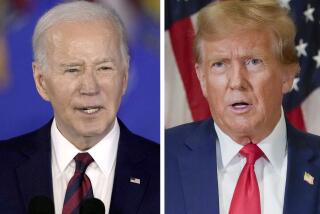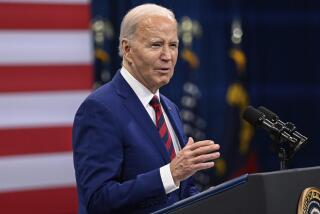Washington stalemates hurting Republicans most, polls indicate
Some Republican congressional leaders have argued for a trench warfare approach to President Obama’s initiatives, fighting him for every yard, but polls released this week indicate the peril of that approach for the GOP as it seeks to rehabilitate itself after a stinging election defeat.
The surveys indicate that the gap in approval between the president and Republicans in Congress has remained extremely large, that Republicans face greater internal divisions than Democrats and that the Democrats have maintained a significant edge in party identification. All told, the data underscore the relatively weak position that House Speaker John A. Boehner (R-Ohio) and other Republican leaders occupy as they prepare for another round of budget talks with Obama as well as debates over immigration and gun control and, in the Senate, confirmation fights for senior administration positions.
A nationwide survey by Public Policy Polling, a Democratic firm that had among the most accurate results in the November election, showed that by 15% to 75%, voters disapprove of the job that congressional Republicans are doing. Congressional Democrats are not exactly loved either, but at 38% to 50%, their ratings came in significantly higher. Even among self-identified Republicans, the party’s representatives in Congress have a negative image, 25% to 61%, reflecting the sharp divisions within the party’s ranks.
By contrast, Obama’s job approval among the voters surveyed stood at 51%, with 46% disapproving. PPP took the survey of 1,100 registered voters in the days immediately after Congress approved the deal partially avoiding the so-called “fiscal cliff.” The margin of error is plus-minus 3 percentage points.
Other polls have shown similar results. Generally, Americans aren’t wild about the compromise that Congress passed. Many doubt it will do much to help the economy, and they tend to blame Republicans more than Democrats and Congress more than the president for the poor outcome.
Approval for Obama and disapproval for congressional Republicans might suggest that the public as a whole wants to see Republicans compromise more with the president. But the public as a whole doesn’t elect members of Congress. Particularly in the House, most Republicans represent conservative districts in which Obama is unpopular. Many Republican elected officials worry more about being challenged in a primary than losing a general election, and some of the polls suggest those anxieties are well founded.
In a Pew Research Center survey that was also taken just after the fiscal-cliff deal, 48% said they approved of how Obama had handled the negotiations, while only 19% approved of the GOP leadership’s work. Pew surveyed 1,003 adults; the survey’s margin of error is plus-minus 3.7 percentage points.
Republicans were notably sour about their own leaders. Among Democrats, 81% said they approved of Obama’s handling of the negotiations, despite complaints by some liberals that White House negotiators gave up too much. By contrast, only 40% of Republicans said they approved of how their party’s leaders had done. Republicans overwhelmingly, 74% to 11%, said Obama had gotten more of what he wanted from the deal, and they didn’t like it.
Democrats also thought Obama got more out of the deal than the GOP did, but they were more closely divided on the question, 53% to 26%. More important, they tended to approve of the compromise. By 50% to 36%, Democrats said they thought the deal would help people like them. Only 12% of Republicans thought the deal would help people like them, while 73% said it would hurt.
PHOTOS: Presidential inaugurations of the past
Taken as a whole, those numbers suggest a significant percentage of Republican voters would like to see their leaders more intransigent -- exactly the opposite of what the broader public seems to be looking for.
The last bit of data comes from Gallup, which aggregated 20,800 interviews conducted across the election year and found that Democrats averaged a five-point lead in party identification over Republicans, 47% to 42%. The numbers for both parties include independents who said they lean toward that party. During 2010 and 2011, Gallup’s surveys showed the two parties roughly even.
The survey results have a margin of error of plus-minus 1 percentage point, but November’s election results indicated that beyond the standard statistical error, Gallup’s surveys were somewhat skewed toward the Republicans, suggesting the Democratic edge in party identification may be even larger.
Follow Politics Now on Twitter and Facebook
Twitter: @DavidLauter
More to Read
Sign up for Essential California
The most important California stories and recommendations in your inbox every morning.
You may occasionally receive promotional content from the Los Angeles Times.











